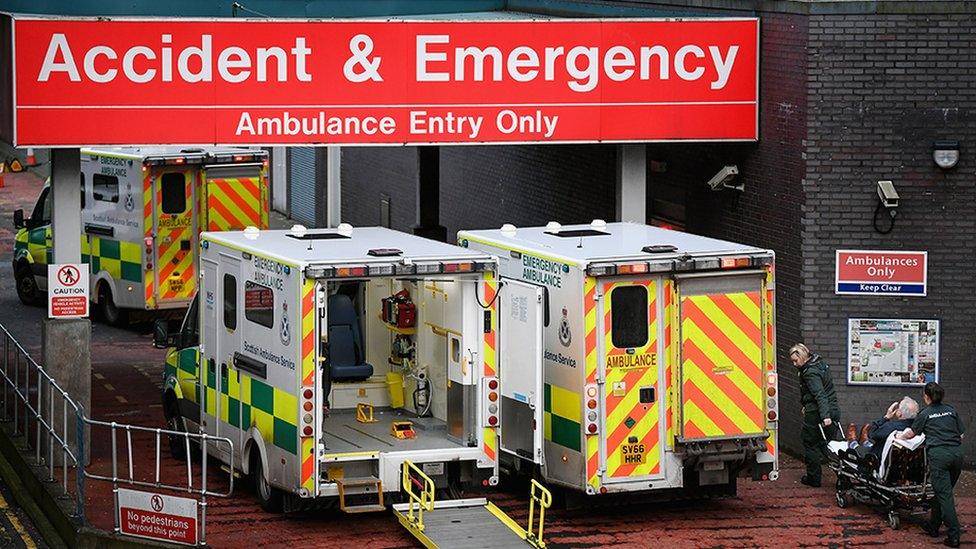Scottish A&E waiting times second worst on record
- Published

Emergency departments in Scottish hospitals are experiencing "winter-type" pressures
Waiting times in accident and emergency departments in Scotland are the second worst on record, new figures show., external
More than three in 10 patients spent longer than four hours in A&E in the week ending 12 December.
In total 69.7% patients were admitted, transferred or discharged within the target time, only slightly better than the record low figure from 24 October.
The Scottish government's target of 95% of patients being seen within four hours has not been met since July 2020.
The weekly figures for Scottish A&E show they fell to just 75% at the start of September this year and have been below that ever since.
In the week ending 12 December, a total of 7,285 people waited longer than four hours before they were attended to, including 1,803 who had to wait more than eight hours, and 598 who were left waiting for more than 12 hours.
NHS Forth Valley was once again the worst-performing health board, with more than half (50.8%) of its A&E patients waiting four hours or more.
It was followed by NHS Lanarkshire (39.5%) and NHS Borders (31.2%).
In the previous week, NHS Tayside became the first mainland health board to exceed the 95% target since the end of June 2021 - seeing 97.6% of its 1,400 A&E patients within four hours. But in the latest figures this number dropped to 90.3%.
The health boards that managed to exceed the government target were NHS Orkney (95.3%), NHS Shetland (96.9%) and NHS Western Isles (96.4%).
Grim reminder
In response to the figures, Scottish Conservatives health spokesman Dr Sandesh Gulhane said the latest "awful" figures are "a grim reminder of Health Secretary Humza Yousaf's failure to get a grip of the crisis in Scotland's emergency wards".
"More people waiting longer to be seen in A&E leads - tragically but inevitably - to avoidable deaths," he said.
Scottish Labour health spokeswoman Jackie Baillie said: "We are now in the midst of one of the toughest winters to face our NHS and it is clear that A&E services are buckling under the pressure.
"Despite the heroic work of frontline staff, our underfunded and overstretched A&E departments are in crisis."
A Scottish government spokeswoman said the health secretary had been very clear that this would be the most difficult winter in NHS history and he was monitoring the situation daily.
She said the latest figures had undoubtedly been impacted by Omicron-related staff absences and were recorded before changes to the isolation policy was in place for health and social care workers.
"The figures are a reminder of the unprecedented challenges our NHS is facing due to direct Covid pressures and the backlog of work created during the pandemic, but healthcare staff continue to provide vital treatment and optimal patient care," she said.
The spokeswoman added: "Emergency units across the UK continue to be hit by the direct and indirect impacts of the pandemic.
"Scotland's core A&E departments continue to outperform those in the rest of the UK, and have done so for more than six years."